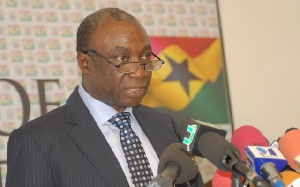 Dr Kwabena Donkor Member of Parliament for the Pru East Constituency
Dr Kwabena Donkor Member of Parliament for the Pru East Constituency
Former Power Minister, Dr. Kwabena Donkor, has emphasised the role the Volta River Authority (VRA) played in the 2015 agreement with AMERI, for the provision of a 250 MW power plant in the heat of the country’s power crisis, when he appeared before Parliament’s Mines and Energy Committee on Friday.
Addressing Members of the committee, he said the VRA was the technical adviser to the Ministry, and the custodian of the asset on behalf of the State.
The application for tariffs, which were set by the Public Utilities Regulatory Commission, was made by the VRA “as the lead agent of the State,” Dr. Donkor also noted.
“…therefore, from the very first meeting in Doha [in the United Arab Emirates], the Chief Executive of VRA was present. The VRA therefore, had a major role to pay, even though the government negotiation team as a whole took collective responsibility.”
“They [the VRA] furnished the ministry and followed up to the committee to brief the committee on how much it was going to cost if we had the resource and were to construct the plant ourselves,” he said.
The issue of tarrifs has come up in the past, with some staff of the VRA saying they are behind $11.5 million losses being incurred by the VRA monthly.
The plant has a tariff of 15 cents per kilowatt hour, but the same power is sold to the Electricity Company of Ghana at a cost of 5 cents per kilowatts hour, leaving a deficit of 10 cents per kilowatts.
Due diligence
Dr. Donkor assured that, due diligence was done ahead of the deal, although he did not have access to relevant documents.
He said he knew for a fact that, the Finance Ministry has a report “because one of the big lending institutions under-ruled the standby letter of credit and they would not do that without doing their due diligence.”
Best value for money
Meanwhile, the Africa & Middle East Resources Investment Group LLC (AMERI) has stated that, its 2015 agreement for the plants offered the best value for money despite government findings that the $510 million deal was bloated by $150 million.
AMERI, in a statement following an appearance, before the Mines and Energy Committee of Parliament on Friday, however, said the government had the right to review the deal if it suspected some wrong doing.